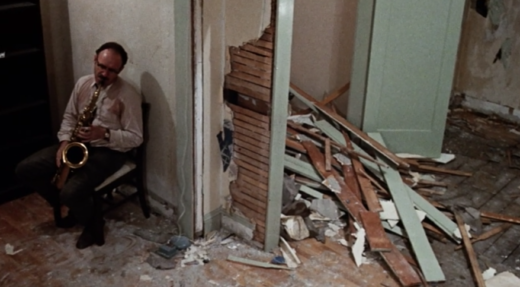An old friend of mine who teaches at a public high school in Minnesota just got word that he’s inherited a 12-week elective course on film, and he’s reached out to me, asking if I might help him design the curriculum. All that he’s been given to work with thus far is a list of the films that have been shown in the past, by the teacher who initially developed the course, and the directive that his students should be encouraged to analyze films through “cultural, social, historical, artistic, and political” lenses. So, with that, I put together the following list of films for him to consider… films that I think are not only highly watchable, and compelling in a narrative sense, but also incredibly important for these times in which we live.
Before I get to the list, I should add that these aren’t necessarily my favorite films. If I were just picking movies that I love, this list would have a lot more Billy Wilder films on it, like Double Indemnity and Sunset Boulevard. And you can be damn sure that it would includes the likes of M, The Night of the Hunter, Mildred Pierce, and The Killing. But, as I alluded to earlier, when I was putting this list together, I was thinking about the situation we now find ourselves in, and the kinds of films that might generate constructive dialogue about relevant issues. And, I should add, I’m sure that there are huge issues with this list that need to be addressed. I know there are likely glaring omissions, and that’s why it occurred to me to share the list here, and open it up for debate. I’m curious to know what you think about the suggestions I’ve made, and my reasoning… With that, here are the twelve films that I wish I’d been shown in high school — twelve films that I think may help young adults of today make at least some sense of the world around them.
1. A Face in the Crowd (1957)… Directed by the controversial filmmaker Elia Kazan, the film tells the story of Larry “Lonesome” Rhodes, an angry alcoholic drifter who shoots to fame practically overnight by spinning folksy (made-up) tales of small town America. [Kazan, as you may recall, outed several of his friends as Communists before the House Committee on Un-American Activities in 1952, ending many a promising career in Hollywood.] As I said back in 2012, upon hearing that Andy Griffith, who portrayed the character of “Lonesome” Rhodes, had passed away, “A Face in the Crowd is an incredibly visionary piece of work, which foretold, among other things, the rise of celebrity culture in the United States, and the popularity of television-enabled con men like Glenn Beck, who drive big ratings by connecting with the masses through the telling of ‘simple truths’ (which are actually anything but), all while serving the political ends of their corporate masters.” And, of course, the film has only become more relevant with the ascent of our populist president, Donald Trump… Here’s the trailer.
2. The Conversation (1974)… I don’t know that it was the first film about surveillance culture, but it’s got to be among the earliest, and it’s just a brilliant, thought-provoking film. Written, produced, and directed by Francis Ford Coppola, and starring Gene Hackman in the role of surveillance expert Harry Caul, the film explores the idea of privacy, and how quickly it’s disappearing in the modern world. [That’s Hackman as Caul in the photo at the top of this post.] As the film’s trailer says, “This is a world of hidden mics, and two-way mirrors, where nothing is private.” And that realization weighs on Hackman’s character as the tables turn, and the surveillor becomes the surveilled. And it’s one of Hackman’s finest, most nuanced cinematic performances. Plus, as if that weren’t enough, you get to hear a pre-Star Wars Harrison Ford deliver the chilling final line — “We’ll be listening to you.” [As Blade Runner didn’t make my final cut, this is the only time you’ll see Ford in the class, assuming my recommendations are accepted.]
3. The Battle of Algiers (1966)… This is the only non-American film on my list. [I know this is as issue, but it couldn’t be helped.] It’s a Italian-Algerian film about imperialism, state-sponsored torture and terrorism. Again, there may have been other films on the subject of terrorism that preceded it, but The Battle of Algiers, which was co-written and directed by Italian filmmaker Gillo Pontecorvo, really brings the subject matter to life in a way that I don’t believe anyone else has come close to. In choosing to capture this particular chapter of the Algerian War of Independence [November 1954 and December 1957] in a pseudo-documentary fashion, using real Algerians instead of trained actors, Pontecorvo created a neorealist masterpiece that still resonates today. [The film really looks as though it’s constructed from newsreel footage, when it’s not.] Pontecorvo once described the film as a “hymn… in homage to the people who must struggle for their independence, not only in Algeria, but everywhere in the third world,” and that comes through in the vivid, yet sensitive, way in which he handles the subject matter. It’s the kind of complicated, nuanced treatment a subject like this deserves, and so rarely gets, and I can’t help but think that students growing up in post-9/11 America would benefit from the knowledge that society has been dealing with issues like torture and terrorism for quite a long time.
OK, I’d hoped to get a lot farther with this. I actually thought that I could write about all twelve films before falling asleep, but I only got though three. So, instead of debating my list, what if, instead, you just try to guess the other ten films that I’m going to be suggesting? Ad of course, feel free to make suggestions of your own.



















